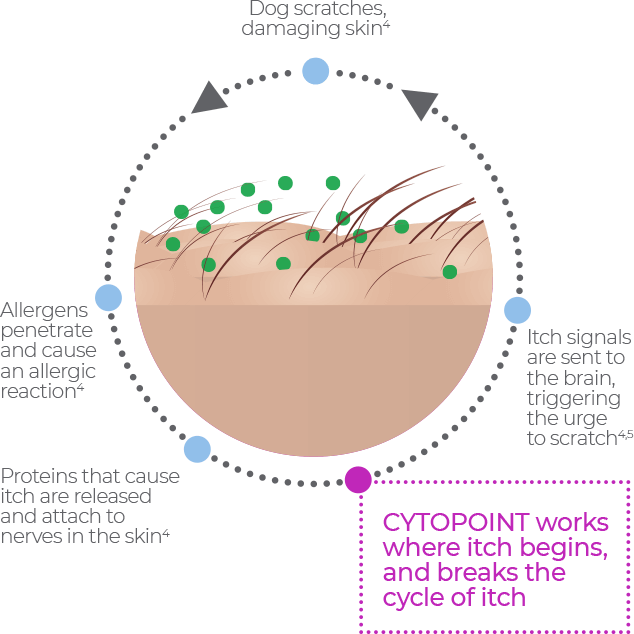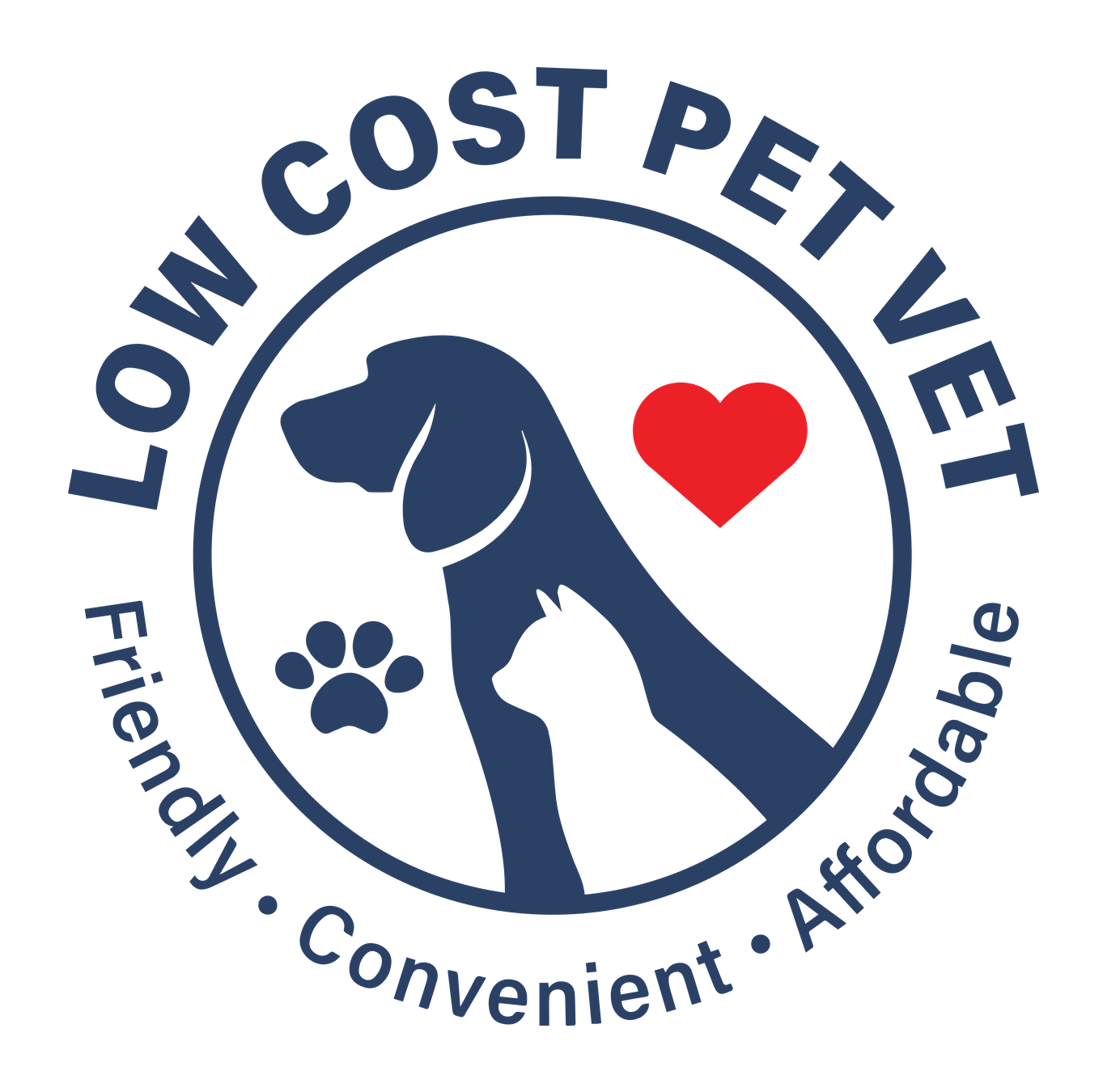Did you know that 1 in 5 pets that vets see have skin problems? We see dogs and cats that are itchy, red, and miserable every day. Every pet’s going to scratch, but it can get out of hand fast!
Itchy skin, or dermatitis, is one of the most common chronic conditions facing dogs and cats in the US. That’s why we specialize in providing dog itchy skin treatment and relief.
Pets suffer from itchy skin for all kinds of reasons – dryness, allergies, fleas, even skin infections all cause itchiness. The skin is the largest organ of the body. If it’s not healthy, your pet might be losing its protection from infections and pathogens. Constant itchiness also causes dermatitis (inflammation). Eventually, that can lead to secondary issues, causing pain and discomfort for your dog or cat.
On top of itching, dogs and cats with itchy skin can develop:
- Painful hotspots
- Fur loss
- Secondary infections
- Hyperpigmentation
- Redness
- Inflammation
Skin problems can also point to deeper issues, such as diet allergies. These can have far reaching consequences for your pet’s entire health.
Why Does My Pet Have Itchy Skin?
The most common cause for pets itching by far is parasites such as fleas and ticks. However, we also see pets with dry skin, allergies, or skin infections. When we treat dogs for itchy skin, we’re looking at all the most common causes to make sure we solve the whole problem.
Fleas, Ticks and Scabies, Oh My!
Fleas, ticks, scabies, mites and other parasites frequently cause itching. That’s why we recommend keeping pets on flea/tick prevention year-round. Most importantly, pets need protection during summer and spring. Pets with flea allergies should always be kept on flea prevention, no matter the season. Fortunately, parasites are easy to treat.
Diagnosing & Treating Parasites
Since parasites are easy to treat and one of the most common reasons for itching, we usually recommend starting treatment with a prevention.
We may also recommend a skin scrape or other diagnostics. These determine what type of parasites we are dealing with, and can also affect what type of prevention we recommend.
We offer several flea preventatives at our full-service clinic in Irving, TX. Bravecto takes care of fleas, ticks, mites, and scabies at only $75 for 3 months of coverage.
When necessary, we can also refer you to a dermatology specialist for more extensive treatment and care.
Infections
Staph, yeast or other types of infections are also common, usually as a secondary condition. Itchy pets can easily damage their skin by itching and biting at the affected area. This causes painful hotspots that can show up overnight. These traumatized areas then quickly become infected by bacteria that lives on the skin.
Even if we remove the primary cause of the itching, we still may need to treat a secondary infection. Fortunately, infections are typically not difficult to diagnose or treat.
Itchy Skin Treatment
We provide affordable diagnosis, treatment, and ongoing care for pets dealing with itchy skin.
Heartworm Treatment
Our team sees many heartworm positive pets and can work with you to create an affordable heartworm treatment plan.
Parvovirus Treatment
We provide affordable parvovirus treatment on an outpatient basis.
Tumor Removal
We have experienced surgical veterinarians who provide affordable tumor removal surgery.
Diagnosing & Treating Skin Infections
Depending on how severe the infection is, we recommend treatment with antibiotics and antipuritics (such as cortisones).
Diet Allergies
Diet allergies are a bit harder to diagnose, but make up around 10 – 30% of cases in dogs and cats with skin disease. In order to identify diet as the cause for your pet’s allergies, we need to put your pet on a 8 week diet trial.
Diagnosing & Treating Diet Allergies
Depending on what food your dog is on now, we’ll develop an 8 week diet trial to see if your pet has food allergies. This includes removing not just your dog’s current dog food, but also treats and even any human food they may be eating.
If your pet improves, we can develop a new diet plan to keep your pet itch-free.
Atopic Dermatitis (Skin Allergies)
 Atopic dermatitis is the second most common allergic skin disease found in dogs, but it can also be found in cats. It’s associated with allergies to the environment – pollen, plants, dander, even insects can all cause atopic dermatitis.
Atopic dermatitis is the second most common allergic skin disease found in dogs, but it can also be found in cats. It’s associated with allergies to the environment – pollen, plants, dander, even insects can all cause atopic dermatitis.
With atopic dogs, usually symptoms will worsen during certain seasons, but overall the condition becomes worse and can lead to other issues if not treated.
Diagnosing & Dog Itchy Skin Treatment (Atopic Dermatitis/Skin Allergies)
Currently there is no cure for atopy. Atopic dogs face itchy skin issues their whole lives – but we can stop the itchiness with revolutionary new treatments such as Cytopoint and Apoquel.
How Much Does Dog Itchy Skin Treatment Cost?
The cost for treating your pet’s itching depends mostly on what’s causing the itching. The most common cause for chronic or seasonal itching is allergies.
Typically, we start by ruling out parasites, infections, and other issues first. Then, we move to treatments that target the itching itself. Please keep in mind these prices reflect our average prices, and may go down or up based off of your pet’s specific situation. (Note: These are breakdowns of frequently recommended diagnostics/treatment for canine itchy skin. Your pet’s situation is unique, and we will develop a unique treatment plan based off of diagnostics and the veterinarian’s exam of your pet. This also does not apply to feline itching)
Example Treatment Plan
- Consultation/Exam & Office Visit – $45
- Skin Scrape – $23.75
- Flea/Tick Preventative – $23 (1 month) – $75 (3 months)
- Cytology – $33
- Antibiotics – Variable
- Anti Inflammatory – Variable
- Medicated Skin Calming Shampoo (Allergy/Skin Irritation Treatment) -Variable
- Cytopoint (Itching Treatment) – Depends on weight, ~$65 – $160. Typically lasts 4 – 6 weeks. (Apoquel, a comparative oral itchy skin treatment is an alternative)
These prices are meant to give you an idea of how much we charge for services. We also provide estimates for your pet’s itchy skin treatment plan up front, and will explain all recommended diagnostics and treatment ahead of time so you can confidently make the best treatment decision for your pet.
